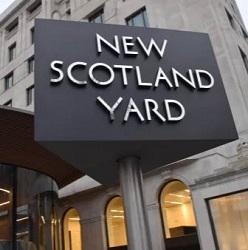Man Caught in North End Road Carrying £240,000 In Cash
Among big cash seizures by Met Police which totalled £94 million in last year
The man, 40 year-old Alexander Guevara Mejia, was walking along the road pulling along what appeared to be an empty suitcase and carrying a rucksack when he was spotted going into a communal area located between two business premises.
Minutes later he came out, and by this time both the suitcase rucksack appeared to be full, He was stopped by police and £200,000 worth of cash was found in the suitcase and £40,000 in the rucksack.
Guevara-Mejia, of Tottenham Lane, in North London, was arrested on suspicion of money laundering offences. He subsequently pleaded guilty to a charge of transferring criminal property and on March 22, was sentenced to two and a half years in prison.
This case is being cited by the Metropolitan Police Service as one of its biggest cash seizures of the last year - a year when the Met says it has seized more assets from criminals than ever before, adding up to a record total of £94 million.
This means the total value of cash seizures, confiscations and assets seized under the Proceeds of Crime Act and the Misuse of Drugs Act is up by more than 40% from £67 million in 2016/17.
One of the main reasons for the increase in the amount seized from criminals has been the value of confiscation orders, which have increased from £20.9 million in 2016/17 to over £55 million in 2017/18.
Confiscation orders are made after a court conviction to deprive criminals of the benefits of their crimes. In January, one of the biggest confiscation orders in the Met’s history was handed out to the men responsible for the theft of gold and jewellery from a vault in Hatton Garden.
The four men responsible for the theft were ordered to pay back more than £6 million or each face another seven years in jail.
The Met has also increased the amount of money claimed from ‘restraint’ of criminal assets and forfeiture orders, which are made at court, from £10.8 million in 2016/17 to 12.6 million in the past financial year.
The MPS has been a leading contributor to the creation of the Criminal Finance Act 2017 over the past two years. It is hoped this act will lead to more criminal assets being seized as the new powers include Account Freezing Orders, which will allow an officer who has reasonable grounds to suspect that money held in a bank account comes from crime, or is intended for future unlawful conduct, to apply to a magistrate’s court for the account to be frozen.
Banks will also be able to submit Defence against Money Laundering reports, which will create further opportunities to seize criminal wealth, recover victim’s monies and disrupt crime.
The new act also includes Unexplained Wealth Orders which will allow the Crown Prosecution Service, on behalf of officers, to apply to the High Court to freeze property and funds which total more than £100,000, providing there are reasonable grounds that the subject, or a person connected to the subject, is involved in serious crime.
Detective Superintendent Nick Stevens, head of the Met’s Criminal Finance team, said: " We want to make sure that crime doesn’t pay and will use all legislation available to us to recover money and assets obtained by criminals."
Funds forfeited and confiscated by the Met are paid to the Home Office, although the police receives a percentage back from the Home Office through the Asset Recovery Incentivisation Scheme.
The Met says it uses these funds to:
Fund and support financial investigation posts within the MPS Business Groups;
Fund and support financial investigation training across the MPS;
Operate and fund a number of different internal schemes to drive performance including the Proceeds of Crime Act Funding Scheme, used to support and encourage Borough proactive policing in relation to acquisitive crime, to generate further POCA opportunities, assist boroughs and Specialist Units in targeting organised criminal groups, gangs and violence.
July 20, 2018
